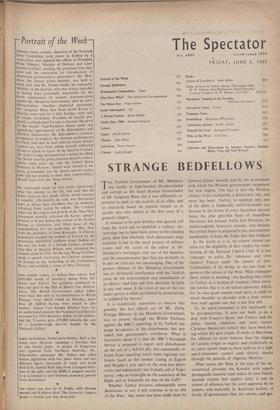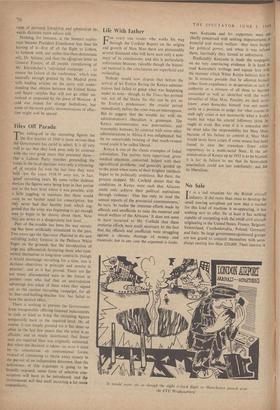STRANGE BEDFELLOWS
rr HE Turkish Government of Mr. Menderes I was hardly so high-handed, bloody-minded and corrupt as the South Korean Government of Mr. Syngman Rhee, but it was sufficiently re- pressive to stink in the nostrils of its allies, and so insecurely based on popular esteem as to tumble into ruin almost at the first snap of a general's fingers.
It remains to be seen whether that general will keep his word not to establish. a military dic- tatorship, but to hand back power to the winning party after free elections. Such democratic mag- nanimity is not in the usual pattern of military coups, and the arrest of the editor of Mr. Menderes's newspaper, and two of his deputies, and the announcement that they are probably to be put on trial are not encouraging. One of the gravest offences of 'the Menderes Government was its dictatorial interference with the Turkish press, by the imprisonment and intimidation of its editors—and how can 'free elections' be held, in any real sense, if the voice of one of the two major parties is either prohibited by prosecutions, or inhibited by threats?
It is incidentally instructive to observe that possibly the last official act of Mr. Zorlu, Foreign Minister in the Menderes Government, was to protest through the British Embassy against the BBC's reporting, in its Turkish lan- guage broadcasts, of the disturbances that pre- ceded that government's overthrow. What is instructive about it is that the BBC's European Service is prepared to report such disturbances on the soil of a NATO ally, but consistently re- frains from reporting much more vigorous out- breaks (such as the student rioting at Zagreb and Skoplje a year ago) on the even less demo- cratic and substantially less friendly soil of Yugo- slavia :* why so forthright on the autocracy of the Right and so lickspittle on that of the Left?
Whether Turkey becomes substantially more democratic or not, it will continue to be an ally of the West: that much has been made clear by General Gursel himself, and by the promptness with which the Western gcivernments recognised the new regime. The fact is that the Western alliance is not exclusiVely a democratic one, and never has been: Turkey, to mention only one of the allies, is implacably anti-Communist not because in the breast of every Anatolian peasant burns the clear gem-like flame of Asquithian liberalism, but because Turks hate Russians, for understandable historical reasons, and because the United States is prepared to pay uncommonly handsomely to keep the Turks that way inclined.
In the world as it is, we cannot choose our allies for the eligibility of their leaders for mem- bership of the National Liberal Club. It is not improper to enlist Dr. Adenauer and even General Franco under, the banner of anti- Communism if by doing so we can hope to preserve the values of the West. What endangers those values is humbug—the humbug that refers to Turkey as a bastion of freedom, when every- one knows that it is an unfree autocracy which, for its own good reasons (and ours), is ready AO stand shoulder to shoulder with a freer society than itself against one that is less free still.
To be anti-Communist is not necessarily to be pro-democratic. It suits our book to do a deal with Franco's Spain, but Franco and his police hound, imprison and even torture Christian Democrats (which they have been do- ing within this past couple of weeks in Barcelona for offences no more heinous than the singing of Catalan songs) as eagerly and vindictively as les purds (good chaps to have with us in a tight anti-Communist corner) , send electric shocks through the genitals of Algerian Muslims.
What harms the West in the eyes of the un- committed, provides the Kremlin with superb propaganda material (and makes its own liberal- minded citizens feel slightly sick), is not its system of alliances but the overt approval by its leaders, and especially its American leaders, of forms of government that are odious, and ges- ture,s of personal, friendship, and admiration to-. wards dictators more odious still.
Nothing, for instance, at the Summit confer- ence became President Eisenhower less than his leaving of it—first of all the flight to Lisbon, to hobnob with our rather-less-than-democratic ally, Dr. Salazar, and then the egregious letter to General Franco, of all people, complaining of Mr. Khrushchev's 'calculated campaign . . to ensure the failure of the conference,' which was naturally enough greeted by the Madrid press with leading articles on the unity and under- standing that obtains between the United States and Spain—articles that will not go either un- noticed or unquoted by the press of Moscow. A cold war makes for strange bedfellows, but some of the more public demonstrations of affec- tion might well be spared.



































 Previous page
Previous page